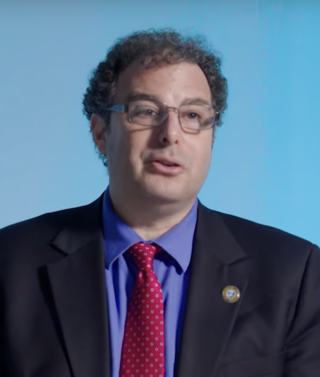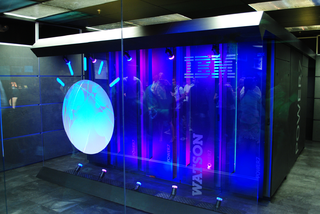Bio-inspired computing, short for biologically inspired computing, is a field of study which seeks to solve computer science problems using models of biology. It relates to connectionism, social behavior, and emergence. Within computer science, bio-inspired computing relates to artificial intelligence and machine learning. Bio-inspired computing is a major subset of natural computation.
The Association for the Advancement of Artificial Intelligence (AAAI) is an international scientific society devoted to promote research in, and responsible use of, artificial intelligence. AAAI also aims to increase public understanding of artificial intelligence (AI), improve the teaching and training of AI practitioners, and provide guidance for research planners and funders concerning the importance and potential of current AI developments and future directions.
Roger Carl Schank was an American artificial intelligence theorist, cognitive psychologist, learning scientist, educational reformer, and entrepreneur. Beginning in the late 1960s, he pioneered conceptual dependency theory and case-based reasoning, both of which challenged cognitivist views of memory and reasoning. He began his career teaching at Yale University and Stanford University. In 1989, Schank was granted $30 million in a ten-year commitment to his research and development by Andersen Consulting, through which he founded the Institute for the Learning Sciences (ILS) at Northwestern University in Chicago.

The Conference and Workshop on Neural Information Processing Systems is a machine learning and computational neuroscience conference held every December. The conference is currently a double-track meeting that includes invited talks as well as oral and poster presentations of refereed papers, followed by parallel-track workshops that up to 2013 were held at ski resorts.
A cognitive architecture refers to both a theory about the structure of the human mind and to a computational instantiation of such a theory used in the fields of artificial intelligence (AI) and computational cognitive science. The formalized models can be used to further refine a comprehensive theory of cognition and as a useful artificial intelligence program. Successful cognitive architectures include ACT-R and SOAR. The research on cognitive architectures as software instantiation of cognitive theories was initiated by Allen Newell in 1990.
The cognitive revolution was an intellectual movement that began in the 1950s as an interdisciplinary study of the mind and its processes, from which emerged a new field known as cognitive science. The preexisting relevant fields were psychology, linguistics, computer science, anthropology, neuroscience, and philosophy. The approaches used were developed within the then-nascent fields of artificial intelligence, computer science, and neuroscience. In the 1960s, the Harvard Center for Cognitive Studies and the Center for Human Information Processing at the University of California, San Diego were influential in developing the academic study of cognitive science. By the early 1970s, the cognitive movement had surpassed behaviorism as a psychological paradigm. Furthermore, by the early 1980s the cognitive approach had become the dominant line of research inquiry across most branches in the field of psychology.

Markus J. Buehler is an American materials scientist and engineer at the Massachusetts Institute of Technology (MIT), where he holds the endowed McAfee Professorship of Engineering chair. He is a member of the faculty at MIT's Department of Civil and Environmental Engineering, where he directs the Laboratory for Atomistic and Molecular Mechanics (LAMM), and also a member of MIT's Center for Computational Science and Engineering (CCSE) in the Schwarzman College of Computing. His scholarship spans science to art, and he is also a composer of experimental, classical and electronic music, with an interest in sonification. He has given several TED talks about his work.

Stephen Grossberg is a cognitive scientist, theoretical and computational psychologist, neuroscientist, mathematician, biomedical engineer, and neuromorphic technologist. He is the Wang Professor of Cognitive and Neural Systems and a Professor Emeritus of Mathematics & Statistics, Psychological & Brain Sciences, and Biomedical Engineering at Boston University.
Janet Lynne Kolodner is an American cognitive scientist and learning scientist. She is a Professor of the Practice at the Lynch School of Education at Boston College and co-lead of the MA Program in Learning Engineering. She is also Regents' Professor Emerita in the School of Interactive Computing, College of Computing at the Georgia Institute of Technology. She was Founding Editor in Chief of The Journal of the Learning Sciences and served in that role for 19 years. She was Founding Executive Officer of the International Society of the Learning Sciences (ISLS). From August, 2010 through July, 2014, she was a program officer at the National Science Foundation and headed up the Cyberlearning and Future Learning Technologies program. Since finishing at NSF, she is working toward a set of projects that will integrate learning technologies coherently to support disciplinary and everyday learning, support project-based pedagogy that works, and connect to the best in curriculum for active learning. As of July, 2020, she
The School of Interactive Computing is an academic unit located within the College of Computing at the Georgia Institute of Technology. It conducts both research and teaching activities related to interactive computing at the undergraduate and graduate levels. These activities focus on computing's interaction with users and the environment, as well as how computers impact the quality of people's lives.

Michael Lederman Littman is a computer scientist, researcher, educator, and author. His research interests focus on reinforcement learning. He is currently a University Professor of Computer Science at Brown University, where he has taught since 2012.

IBM Watson is a computer system capable of answering questions posed in natural language. It was developed as a part of IBM's DeepQA project by a research team, led by principal investigator David Ferrucci. Watson was named after IBM's founder and first CEO, industrialist Thomas J. Watson.
The LIDA cognitive architecture is an integrated artificial cognitive system that attempts to model a broad spectrum of cognition in biological systems, from low-level perception/action to high-level reasoning. Developed primarily by Stan Franklin and colleagues at the University of Memphis, the LIDA architecture is empirically grounded in cognitive science and cognitive neuroscience. In addition to providing hypotheses to guide further research, the architecture can support control structures for software agents and robots. Providing plausible explanations for many cognitive processes, the LIDA conceptual model is also intended as a tool with which to think about how minds work.
Jim Davies is an American/Canadian cognitive scientist, playwright, artist, and author. He received his bachelor's degree in philosophy from the State University of New York at Oswego, his masters in psychology and his Ph.D. in computer science from the Georgia Institute of Technology. He is a full professor of Cognitive Science at the Institute of Cognitive Science and the School of Computer Science at Carleton University in Ottawa, Ontario where he is the director of the Science of Imagination Laboratory. His research focuses on visual reasoning, analogy, and imagination.
Joshua Brett Tenenbaum is Professor of Computational Cognitive Science at the Massachusetts Institute of Technology. He is known for contributions to mathematical psychology and Bayesian cognitive science. According to the MacArthur Foundation, which named him a MacArthur Fellow in 2019, "Tenenbaum is one of the first to develop and apply probabilistic and statistical modeling to the study of human learning, reasoning, and perception, and to show how these models can explain a fundamental challenge of cognition: how our minds understand so much from so little, so quickly."
A cognitive computer is a computer that hardwires artificial intelligence and machine learning algorithms into an integrated circuit that closely reproduces the behavior of the human brain. It generally adopts a neuromorphic engineering approach. Synonyms include neuromorphic chip and cognitive chip.
Cognitive computing refers to technology platforms that, broadly speaking, are based on the scientific disciplines of artificial intelligence and signal processing. These platforms encompass machine learning, reasoning, natural language processing, speech recognition and vision, human–computer interaction, dialog and narrative generation, among other technologies.
Radhika Nagpal is an Indian-American computer scientist and researcher in the fields of self-organising computer systems, biologically-inspired robotics, and biological multi-agent systems. She is the Augustine Professor in Engineering in the Departments of Mechanical and Aerospace Engineering and Computer Science at Princeton University. Formerly, she was the Fred Kavli Professor of Computer Science at Harvard University and the Harvard School of Engineering and Applied Sciences. In 2017, Nagpal co-founded a robotics company under the name of Root Robotics. This educational company works to create many different opportunities for those unable to code to learn how.

Francesca Rossi is an Italian computer scientist, currently working at the IBM Thomas J. Watson Research Center as an IBM Fellow and the IBM AI Ethics Global Leader.
Georgia Tech Online Master of Science in Computer Science (OMSCS) is a Master of Science degree offered by the College of Computing at Georgia Tech. The program was launched in 2014 in partnership with Udacity and AT&T and delivered through the massive open online course (MOOC) format. Georgia Tech has received attention for offering an online master's degree program for under $7,000 that gives students from all over the world the opportunity to enroll in a top 10-ranked computer science program. The program has been recognized by the University Professional and Continuing Education Association, Fast Company, and the Reimagine Education Awards for excellence and innovation.






